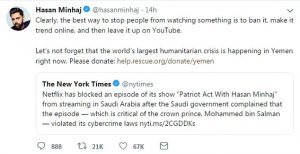In his episode of the Patriot Act, titled “Saudi Arabia”, Hasan Minhaj analyzes the role of Saudi Crown Prince, Muhammad bin Salman (MBS) in the murder of Washington Post Journalist, Jamal Khashoggi. The power that MBS once had over Islam, being labelled as “the reformer [that] the Arab world needed”, was soon destroyed by the revelations surrounding his killing of Khashoggi. More interesting than the details of Khashoggi’s killing itself, however, is the discussion on the various comedic techniques that Minhaj employs in order to narrate this news effectively. In his episode, Minhaj handles the fusion of real news (and other non-fiction) video clips and the comparison of Western and Muslim etiquette, particularly well. These are features that contribute to his engagement with, and advocacy against, the common trope that the “Muslim mind” is irrational.
Minhaj’s initial framing of MBS empathizes with those (mostly in the West) that supported him, but later goes on to demonstrate how, in reality, this praise and recognition is harmful to the representation and values of all other Muslims. The mention of one of MBS’s early accomplishments – lifting the ban on women driving – is evidence of the former, kind-hearted and principled, portrayal – one that may have fooled non-Muslims. However, the subsequent news headline clip, revealing his bizarre ways – namely holding his mother on house arrest so that she couldn’t interfere with his rise to power – proves just how far he would go to maintain his position. MBS’s role in the murder of Khashoggi comes as no surprise to nationals – his nickname literally means “Father of the bullet” – and yet the West is only just learning of his criminality. Through the incorporation of real news footage, Minhaj comments on how contrary the western perception of MBS is, compared to the Muslim experience of his control.
Minhaj continues to compare the West to Islam, but instead of framing Islam as irrational, he criticizes the choices of the West. The anecdote that comes to mind and best captures this pattern is the joke that spawns from his conversation on lotas. Minhaj jokes that so many people find this method (using water and your hands) gross, and yet toilet paper (the western method) is far grosser. He draws a comparison between how one typically handles removing dog feces from their expensive shoes and how they clean their body after using the toilet (both situations, where toilet paper is insufficient), and begs the question: “why don’t we treat our butts with the same respect as we treat our Air Jordans?” Minhaj makes very intelligent comedic decisions that seamlessly weave together aspects of Western and Islamic cultures in order to frame his target audience, but also to support his active engagement and fluency in both cultures.
Minhaj’s use of comedy effectively distances himself from the trope that the “Muslim mind” is irrational and instead flips this stigma entirely. Islam’s affiliation with Saudi Arabia, unlike America’s, is not a choice. Thus, framing an entire religion based on the judgement of such a small percentage of its people, is foolish, but when MBS extends the most basic human rights and suddenly he’s in Oprah’s book club, receiving tremendous praise; that is irrational.
Works Cited
Minhaj, Hasan. “Saudi Arabia.” Patriot Act, Netflix, 28 Oct. 2018.
